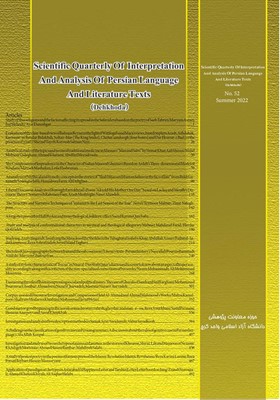Evaluation of the class-based view of Bahram Beyzai in the light of Wittfogel's and Marx's views, based on plays Arash, Azhdahak, Karname-ye Bandar Bidakhsh, Soltan-Mar [The King Snake], Chahar sandoogh [four boxes] and Dar Hozour-e Bad [in the presence of wind]
Subject Areas : Persian language and literature textsShirzad Tayefi 1 * , Koroush Salman Nasr 2
1 - Associate Professor Persian Language and Literature, Allameh Tabataba'i University, Tehran, Iran
2 - PhD Student Persian Language and Literature, Allameh Tabataba'i University, Tehran, Iran.
Keywords: class-based view, Marx, play (theatre), oriental tyrant, Wittfogel, Bahram Beyzai,
Abstract :
One of the important ways to understand the meaning of a literary work is to understand its social, political and historical attitudes. Accordingly, the recognition of the theories of other fields of human sciences is important. The oriental tyrant theory of Wittfogel's and Marx's views on the concept of class in society are among the approaches that help us understand how social classes are formed. The oriental tyrant theory shows how tyrant governing the oriental, hydraulic empire-based societies, causes the formation of the classes of society. In Marxism, Marxian class theory explains the impact of private ownership and ultimately capitalism on the formation of classes in society. In this way, it is possible to study communities in literary works. Bahram Beyzai is an Iranian playwright that social classes and conflicts are well represented in his works; accordingly, in order to understand his works, the class attitudes in his works must be known. In this study, based on the Wittfogel's and Marx's class views, his plays, including Arash, Azhdahak, Karname-ye Bandar Bidakhsh, Soltan-Mar [The King Snake], Chahar sandoogh [four boxes] and Dar Hozour-e Bad [in the presence of wind], are classically examined. To this end, while using the qualitative analysis method, we will examine his works by relying on library and documentary-based studies and using the classical theories of Wittfogel and Marx. The results show that plays Arash, Azhdahak and Karname-ye Bandar Bidakhsh are associated with Whittfogel's class attitudes; while plays Chahar sandoogh [four boxes] and Dar Hozour-e Bad [in the presence of wind] are related to Marx's class approach. The play of Soltan-Mar [The King Snake] follow an intermediate class approach, which can be read by both Marx's and Wittfogel's approach.
کتابها
آندرسون، پری (1390) تبارهای دولت استبدادی، ترجمۀ حسن مرتضوی، تهران: ثالث.
اوستا (1385) گزارش و پژوهش جلیل دوستخواه، چاپ10، تهران: مروارید.
بیضایی، بهرام (1389) مجلس قربانی سنّمار، چاپ چهارم، تهران: روشنگران و مطالعات زنان.
بیضایی، بهرام (1361) سلطان مار، تهران: تیراژه.
بیضایی، بهرام (1396) دیوان نمایش 1، چاپ 5، تهران: روشنگران و مطالعات زنان.
بیضایی، بهرام (1396) دیوان نمایش 2، چاپ 5، تهران: روشنگران و مطالعات زنان.
چارلز رایت، میلز (1379) مارکس و مارکسیسم، ترجمۀ محمد رفیعی مهرآبادی، تهران: خجسته.
رضاقلی، علی (1389) جامعهشناسی نخبهکشی، چاپ 32. تهران: نی.
کاتوزیان، محمدعلی (همایون) (1385) تضاد دولت ملت، نظریۀ تاریخ و سیاست در ایران، ترجمۀ علیرضا طیب، چاپ 4، تهران: مرکز.
مونتسکیو (1370) روح القوانین، ترجمۀ علیاکبر مهتدی، چاپ 9، تهران: امیرکبیر.
ویتفوگل، کارل آوگوست (1391) استبداد شرقی؛ بررسی تطبیقی قدرت تام، ترجمۀ محسن ثلاثی، تهران: ثالث.
هگل (1356) عقل در تاریخ، ترجمۀ حمید عنایت، تهران: دانشگاه صنعتی آریامهر.
مقالات
دریایی، تورج. (1392). آرش شواتیر که بود؟. بخارا،15(95 و 96)، 166- 176.
طباطبایی، احمد. (1343). دیو و جوهر اساطیری آن. زبان و ادبیات فارسی، 16(69)، Dor: 20.1001.1.22517979.1343.16.69. 4.0
_||_Books
Anderson, Perry (2011) Descendants of an Authoritarian Government, translated by Hassan Mortazavi, Tehran: Third.
Avesta (2006) Report and research of Jalil Dostkhah, 10th edition, Tehran: Morvarid.
Beizai, Bahram (1982) Sultan Mar, Tehran: Circulation.
Beizai, Bahram (2010) Majnar Ghorbani Senmar, Fourth Edition, Tehran: Enlightenment and Women's Studies.
Beizai, Bahram (2017) Divan Namayesh 1, 5th edition, Tehran: Roshangaran and Women's Studies.
Beizai, Bahram (2017) Divan Namayesh 2, 5th edition, Tehran: Roshangaran and Women's Studies.
Charles Wright, Mills (2000) Marx and Marxism, translated by Mohammad Rafiei Mehrabadi, Tehran: Khojasteh.
Hegel (1977) Reason in History, translated by Hamid Enayat, Tehran: Aria Mehr University of Technology.
Katozian, Mohammad Ali (Homayoun) (2006) The Conflict of the Nation State, Theory of History and Politics in Iran, translated by Alireza Tayeb, 4th edition, Tehran: Markaz.
Montesquieu (1991) The Spirit of Laws, translated by Ali Akbar Mohtadi, 9th edition, Tehran: Amirkabir. Rezagholi, Ali (2010) Sociology of Elitism, Edition 32. Tehran: Ney.
Wittfogel, Carl August (2012) Eastern tyranny; A Comparative Study of Total Power, translated by Mohsen Thalasi, Tehran: Sales.
Articles
Daryayi, Touraj. (2013). Who was Arash Schwatter? Bukhara, 15 (95 and 96), 166-176.
Tabatabai, Ahmad (1964). The demon and its mythical essence. Persian Language and Literature, 15 (95&96), 39-45.Dor: 20.1001.1.22517979.1343.16.69. 4.0.

